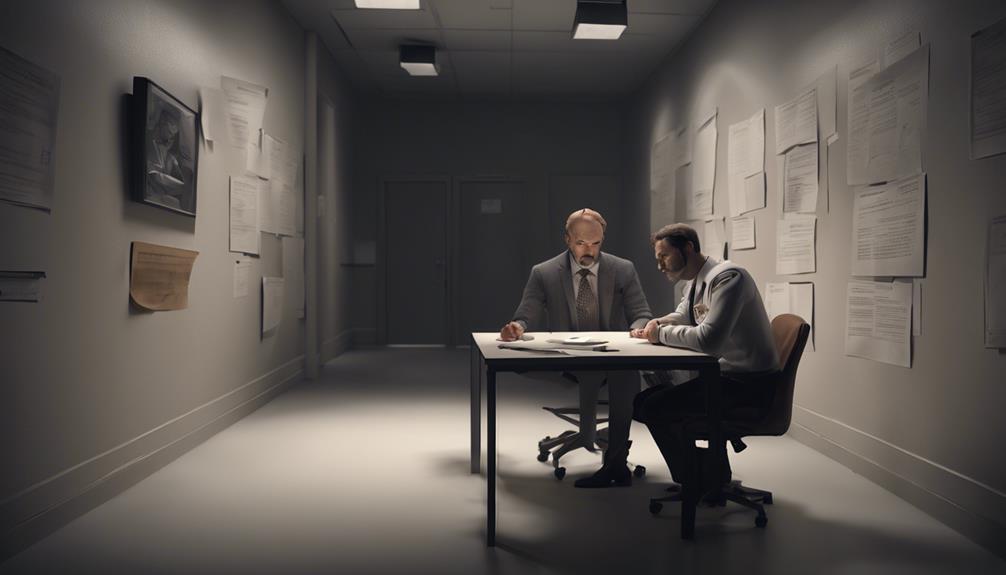Forensic Psychologist Job Description
Forensic psychologists analyze behavioral patterns, testify in court, create suspect profiles, and evaluate mental states. They need a doctoral degree in psychology, state license, specialized forensic training, and internships. Proficiency in assessments, strong analytical skills, and clear communication are essential. They work in court, correctional facilities, or academia applying psychological expertise to legal issues ethically. Career growth opportunities include senior positions, specialization in criminal behavior or trauma, and meeting demand in legal, investigative, and correctional settings.
Key Takeaways
- Analyzing behavioral patterns and providing expert testimony in legal proceedings.
- Creating profiles of potential suspects through criminal profiling.
- Conducting thorough case evaluations to understand criminal behavior.
- Utilizing assessment tools for mental state, competency, and risk assessment.
- Testifying in court to assist judges and juries with expert testimony.
Roles and Responsibilities
Analyzing behavioral patterns and providing expert testimony in legal proceedings are key responsibilities of a forensic psychologist. These professionals conduct thorough case evaluations to understand the psychological aspects of criminal behavior. Through criminal profiling, forensic psychologists create profiles of potential suspects based on behavior, motives, and psychological traits. This process helps law enforcement agencies narrow down suspects and prioritize leads in investigations.
In case evaluations, forensic psychologists utilize various assessment tools and techniques to evaluate individuals involved in legal cases. They assess factors such as mental state, competency to stand trial, risk assessment, and potential for rehabilitation. By conducting these evaluations, forensic psychologists provide valuable insights into the mental state of individuals within the legal system.
Additionally, forensic psychologists play an important role in providing expert testimony in court. They explain their findings in a clear and concise manner to assist judges and juries in understanding complex psychological concepts related to the case at hand. This testimony can have a significant impact on legal proceedings and outcomes.
Educational Requirements
When considering a career as a forensic psychologist, meeting specific educational requirements is vital to guarantee a strong foundation in the field. To become a successful forensic psychologist, individuals must fulfill the following key educational components:
- Licensing Process: Forensic psychologists are typically required to hold a doctoral degree in psychology from an accredited institution. Additionally, they must obtain a state license to practice independently. This licensing process ensures that professionals meet the necessary standards to provide quality services within the legal system.
- Specialized Training: In addition to a doctoral degree, aspiring forensic psychologists often pursue specialized training in forensic psychology. This may include completing internships or fellowships in forensic settings, such as correctional facilities or court clinics. Such training equips individuals with the specific knowledge and skills needed to navigate the complexities of the legal system and work effectively with clients involved in legal proceedings.
Meeting these educational requirements is essential for aspiring forensic psychologists to establish credibility in the field and effectively assist clients within the legal system.
Skills and Qualifications
Demonstrating proficiency in a diverse range of psychological assessments and research methodologies is essential for individuals seeking to excel as forensic psychologists. A strong foundation in psychological assessment enables forensic psychologists to evaluate individuals involved in the legal system effectively. Understanding different assessment tools and techniques allows them to evaluate various factors such as cognitive functioning, personality traits, and mental health issues that may be relevant to criminal behavior.
Additionally, skills in research methodologies are critical for conducting studies on criminal behavior, risk assessment, and treatment outcomes within forensic settings.
In addition to technical skills, forensic psychologists must possess strong analytical abilities to interpret complex data and draw meaningful conclusions. They should also have excellent communication skills to convey their findings clearly in written reports, expert testimonies, and interactions with legal professionals. Moreover, critical thinking skills are essential for identifying patterns of behavior, evaluating the credibility of information, and making sound judgments based on evidence.
Work Environment
In the work environment of forensic psychologists, they typically engage in a variety of settings where their expertise in psychological assessment and research is applied to legal contexts. Forensic psychologists can be found working in:
- Courts: Forensic psychologists often testify in court as expert witnesses, providing insights into the psychological aspects of a case based on their evaluations and research findings.
- Correctional Facilities: In these settings, forensic psychologists conduct clinical assessments to determine the mental health needs of inmates, develop treatment plans, and sometimes provide therapy to individuals within the criminal justice system.
- Research Institutions: Forensic psychologists may work in academic or research settings, conducting studies, analyzing data, and publishing findings on topics such as criminal behavior, witness testimony, and the effectiveness of intervention programs.
The work environment for forensic psychologists demands a high level of professionalism, ethical conduct, and a thorough understanding of both psychological principles and legal procedures to effectively contribute to the legal system.
Career Outlook and Advancement
The career outlook and advancement opportunities for forensic psychologists are influenced by a combination of factors including experience, specialization, and demand within the field. Forensic psychologists can explore diverse career opportunities in settings such as law enforcement agencies, court systems, mental health facilities, and research institutions.
With experience, professionals can advance to senior positions like chief forensic psychologist, expert witness, or forensic psychology professor. Specializing in areas such as criminal behavior, child custody evaluations, or trauma assessments can also enhance career prospects and professional growth.
The demand for forensic psychologists is expected to grow in the coming years, driven by the need for psychological expertise in legal proceedings, criminal investigations, and correctional facilities. As awareness of mental health issues in legal contexts increases, so do opportunities for forensic psychologists to contribute their skills.
Continuous professional development, staying current with research trends, and networking within the forensic psychology community are essential for advancing in this dynamic field.
Conclusion
To sum up, the role of a forensic psychologist involves:
- Evaluating individuals involved in legal matters
- Providing expert testimony
- Conducting research to understand criminal behavior
With a strong educational background in psychology and specific training in forensic psychology, individuals in this field must possess:
- Excellent analytical skills
- Strong communication skills
- Effective problem-solving skills
The work environment for forensic psychologists varies, including:
- Prisons
- Courtrooms
- Private practices
The career outlook for this profession is promising, with opportunities for advancement and growth in the field.







